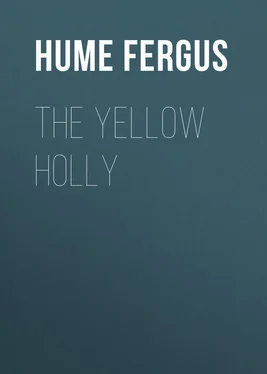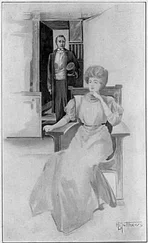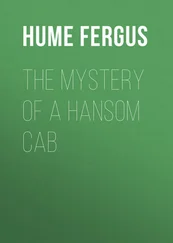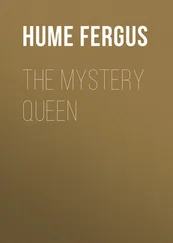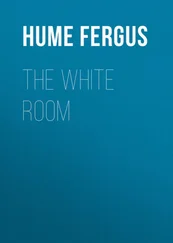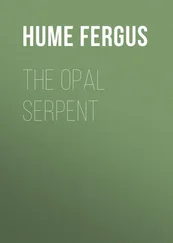Fergus Hume - The Yellow Holly
Здесь есть возможность читать онлайн «Fergus Hume - The Yellow Holly» — ознакомительный отрывок электронной книги совершенно бесплатно, а после прочтения отрывка купить полную версию. В некоторых случаях можно слушать аудио, скачать через торрент в формате fb2 и присутствует краткое содержание. Жанр: Классическая проза, foreign_prose, foreign_language, на английском языке. Описание произведения, (предисловие) а так же отзывы посетителей доступны на портале библиотеки ЛибКат.
- Название:The Yellow Holly
- Автор:
- Жанр:
- Год:неизвестен
- ISBN:нет данных
- Рейтинг книги:4 / 5. Голосов: 1
-
Избранное:Добавить в избранное
- Отзывы:
-
Ваша оценка:
- 80
- 1
- 2
- 3
- 4
- 5
The Yellow Holly: краткое содержание, описание и аннотация
Предлагаем к чтению аннотацию, описание, краткое содержание или предисловие (зависит от того, что написал сам автор книги «The Yellow Holly»). Если вы не нашли необходимую информацию о книге — напишите в комментариях, мы постараемся отыскать её.
The Yellow Holly — читать онлайн ознакомительный отрывок
Ниже представлен текст книги, разбитый по страницам. Система сохранения места последней прочитанной страницы, позволяет с удобством читать онлайн бесплатно книгу «The Yellow Holly», без необходимости каждый раз заново искать на чём Вы остановились. Поставьте закладку, и сможете в любой момент перейти на страницу, на которой закончили чтение.
Интервал:
Закладка:
Fergus Hume
The Yellow Holly
CHAPTER I
"MRS. JERSEY RECEIVES"
She did not put the sacramental phrase on her cards, as no invitations were sent out. These were delivered verbally by boarders desirous of seeing their friends present on Friday evening. Mrs. Jersey dignified her gatherings with the name of "At Homes," but in truth the term was too majestic for the very mild entertainment she provided weekly.
It was really a scratch party of nobodies, and they assembled as usual in the drawing-room on this especial evening, to play and not to work. Mrs. Taine laid aside her eternal knitting; Miss Bull dispensed with her game of "Patience;" Mr. Granger sang his one song of the early Victorian Epoch-sometimes twice when singers were scarce; and Mr. Harmer wore his antiquated dress-suit. On these festive occasions it was tacitly understood that all were to be more or less "dressy," as Mrs. Jersey put it, and her appearance in "the diamonds" signalized the need of unusual adornment. These jewels were the smallest and most inferior of stones; but diamonds they undeniably were, and the boarders alluded to them as they would have done to the Kohinoor.
In her black silk gown, her lace cap, and "the diamonds" Mrs. Jersey looked-so they assured her-quite the lady.
Was she a lady? No one ever asked that leading question, as it would have provoked an untruth or a most unpleasant reply. She admitted in expansive moments to having seen "better days," but what her actual past had been-and from her looks she had one-none ever discovered. The usual story, produced by an extra glass of negus, varied so greatly in the telling that the most innocent boarder doubted. But Mrs. Jersey was always treated with respect, and the boarders called her "Madame" in quite a French way. Why they should do so, no one ever knew, and Mrs. Jersey herself could not have explained. But the term had become traditional, and in that conservative mansion tradition was all-powerful.
Few friends presented themselves on this particular Friday evening, for it the wind was extremely foggy, and none of them could afford cabs. Even those who patronized the nearest bus line, had some distance to walk before they knocked at the Jersey door, and thus ran a chance of losing their way. Either in light or darkness the house was hard to find, for it occupied the corner of a particularly private square far removed from the Oxford Street traffic. As a kind of haven or back-water, it received into its peace those who found the current of the River of Life running too strong. Decayed ladies, disappointed spinsters, superannuated clerks, retired army officers, bankrupt dreamers-these were the derelicts which had drifted hither. Mrs. Jersey called these social and commercial failures "paying guests," which flattered their pride and cost nothing. She was something of a humbug, and always ready with the small change of politeness.
It was quite an asylum for old age. None of the guests were under fifty, save a newcomer who had arrived the previous week, and they wondered why he came amongst them. He was young, though plain-looking; he was fashionably dressed, though stout, and he chatted a West-End jargon, curiously flippant when contrasted with their prim conversation. This was the first time he had been present at Madame's reception, and he was explaining his reasons for coming to Bloomsbury. Mrs. Jersey introduced him as "Leonard Train, the distinguished novelist," although he had published only one book at his own cost, and even that production was unknown to the boarders. They read Thackeray and his contemporaries, and manifested a proper scorn for the up-to-date novelist and his analytical methods.
Mr. Train, with a complacency which showed that he entertained the highest opinion of his own powers, stood on the hearth-rug, and delivered himself of his errand to Bloomsbury.
"Fashionable novelists," said he, in a still, small voice, which contrasted curiously with his massive proportions, "have overdone the business of society and epigrams. We must revert to the Dickens style. I have therefore taken up my residence here for a brief period to study Old-World types." Here he looked round with a beaming smile. "I am glad to find so rich a field to glean."
This doubtful compliment provoked weak smiles. The boarders did not wish to be rude, but they felt it was impossible to approve of the young man. Not being sufficiently modern to court notoriety, one and all disliked the idea of being "put in a book." Mrs. Taine, conscious of her weak grammar, looked uneasily at Miss Bull, who smiled grimly and then glared at Train. Granger drew himself up and pulled his gray mustache; he was the buck of the establishment, and Harmer nodded, saying, "Well, well!" his usual remark when he did not understand what was going on. Only Madame spoke. Train had taken a sitting-room as well as a bedroom, therefore he must be rich, and as he had not haggled over terms it was necessary that he should be flattered. Mrs. Jersey saw a chance of making money out of him.
"How delightful," she said in her motherly manner; "I hope you will say nice things about us, Mr. Train."
"I shall tell the truth, Madame. The truth does not flatter."
Mrs. Jersey became still more motherly and paid a compliment. "That depends, Mr. Train. If the truth were spoken about you, for instance."
It was really a very nice compliment; but Miss Bull, with malice aforethought, spoilt it in the utterance by laughing pointedly. Train, who had already set his face for a smile, grew red, and Madame darted a look at Miss Bull quite out of keeping with her motherly manner. More than this, she spoke her mind. "I hope, Mr. Train, that you will speak the whole truth of some of us."
Miss Bull shrugged her thin shoulders, and in direct contradiction to the traditions of the evening produced her pack of cards. She played a complicated game called "The Demon," and never went to bed until she had achieved success at least thrice. Even when driven from the drawing-room she would finish the game in her bedroom, and sometimes sat up half the night when her luck was bad. To abstain on this society evening always annoyed her, and since Madame had been rude Miss Bull seized the opportunity to show her indifference, and enjoy, by doing so, her favorite pastime. She was a small, thin, dry old maid, with a pallid face and bright black eyes. Her mouth was hard, and smiled treacherously. No one liked her save Margery, the niece of Mrs. Jersey. But Margery was supposed to be queer, so her approval of Miss Bull mattered little.
"Perhaps Mr. Granger will oblige us with a song," suggested Madame, smoothing her face, but still inwardly furious.
Mr. Granger, who had been waiting for this moment, was only too happy. He knew but one song, and had sung it dozens of times in that very room. It was natural to suppose that he knew it by heart. All the same he produced his music, and read the words as he sang. Margery played his accompaniment without looking at the notes. She was as familiar with them as she was with the moment when Mr. Granger's voice would crack. This night he cracked as usual, apologized as usual, and his hearers accepted the apology as usual, so it was all very pleasant. "'The Death of Nelson,'" said Granger, "is a difficult song to sing when the singer is not in voice. The fog, you know-"
"Quite so," murmured Train, politely. "Do you know 'Will-o-the-Wisp,' Mr. Granger?"
Mr. Granger did not, much to his regret, and Mr. Harmer joined in the conversation. "Now there's a song," said he-"'Will-o-the-Wisp.' I knew a man who could bring the roof down with that song. Such lungs!"
"I don't love that loud shouting, myself," said Mrs. Taine in her fat voice. "Give me something soft and low, like 'My Pretty Jane!'"
Читать дальшеИнтервал:
Закладка:
Похожие книги на «The Yellow Holly»
Представляем Вашему вниманию похожие книги на «The Yellow Holly» списком для выбора. Мы отобрали схожую по названию и смыслу литературу в надежде предоставить читателям больше вариантов отыскать новые, интересные, ещё непрочитанные произведения.
Обсуждение, отзывы о книге «The Yellow Holly» и просто собственные мнения читателей. Оставьте ваши комментарии, напишите, что Вы думаете о произведении, его смысле или главных героях. Укажите что конкретно понравилось, а что нет, и почему Вы так считаете.
